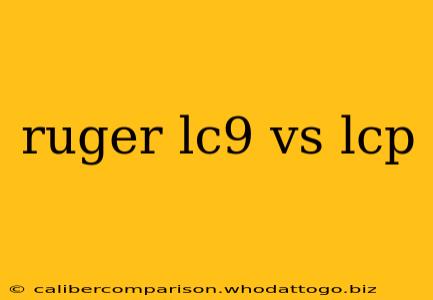Choosing a concealed carry pistol is a deeply personal decision, heavily influenced by individual needs and preferences. Two popular choices from Ruger often top the list: the LC9 and the LCP. This comparison will delve into the key differences between the Ruger LC9 and LCP, helping you determine which firearm best suits your needs.
Size and Weight: A Key Differentiator
The most significant difference between the LC9 and LCP lies in their size and weight. The LCP is a significantly smaller and lighter pistol, making it ideal for deep concealment. Its diminutive size, however, comes with compromises in terms of shootability and capacity.
The LC9, while still compact, offers a more substantial grip, leading to improved control and accuracy. Its added weight also contributes to reduced recoil, making it a more comfortable firearm to shoot, especially for those new to handguns.
| Feature | Ruger LC9 | Ruger LCP |
|---|---|---|
| Size | Larger, more substantial grip | Smaller, more compact |
| Weight | Heavier | Lighter |
| Concealability | Easier than LCP but still good | Excellent, easily concealed |
| Shootability | More comfortable, less recoil | More challenging, more recoil |
Capacity and Caliber: Power vs. Packability
The LC9 typically holds a higher capacity magazine than the LCP. While specific magazine sizes vary depending on model and generation, the LC9 generally offers a 7+1 capacity compared to the LCP's 6+1 or even smaller, depending on the model. Both pistols generally chamber the popular 9mm Luger (LC9) and .380 ACP (LCP) cartridges.
The 9mm Luger round offered in the LC9 provides significantly more stopping power compared to the .380 ACP of the LCP. This is a critical factor to consider in self-defense situations. The increased power, however, comes with increased recoil.
Recoil and Shootability: Comfort and Control
As mentioned, the LC9's larger size and heavier weight result in noticeably less recoil than the LCP. This makes the LC9 significantly more comfortable to shoot, particularly for extended practice sessions. The LCP's snappy recoil can be challenging for smaller-framed shooters or those new to firearms. This difference greatly affects accuracy and the overall shooting experience.
Features and Considerations
Both pistols offer a number of features suitable for concealed carry, including:
- Lightweight Construction: Both are built for easy concealment, albeit with differing degrees of success.
- Double-Action-Only (DAO) Trigger: Contributes to safety and simplicity.
- Compact Design: Allows for comfortable concealed carry in various holsters and carry methods.
However, there are some key differences to consider:
- Ergonomics: The LC9 generally offers better ergonomics, providing a more comfortable and controllable shooting experience.
- Sights: Sight quality can vary between models and generations; this is a factor to carefully assess before purchasing either pistol.
- Reliability: Both Ruger models are known for their reliability, but individual experiences may vary.
Conclusion: The Right Choice Depends on You
The best choice between the Ruger LC9 and LCP hinges entirely on your individual needs and priorities. If ultimate concealability is paramount and you prioritize a lightweight pistol, the LCP might be the better option. However, if you prioritize shootability, accuracy, greater capacity, and more stopping power, the LC9 is likely the more suitable choice. Consider factors such as hand size, shooting experience, and comfort levels before making your decision. It's always recommended to handle both pistols before purchasing to get a feel for which one best fits your hands and shooting style. Remember to prioritize proper training and safe gun handling practices regardless of your chosen firearm.

